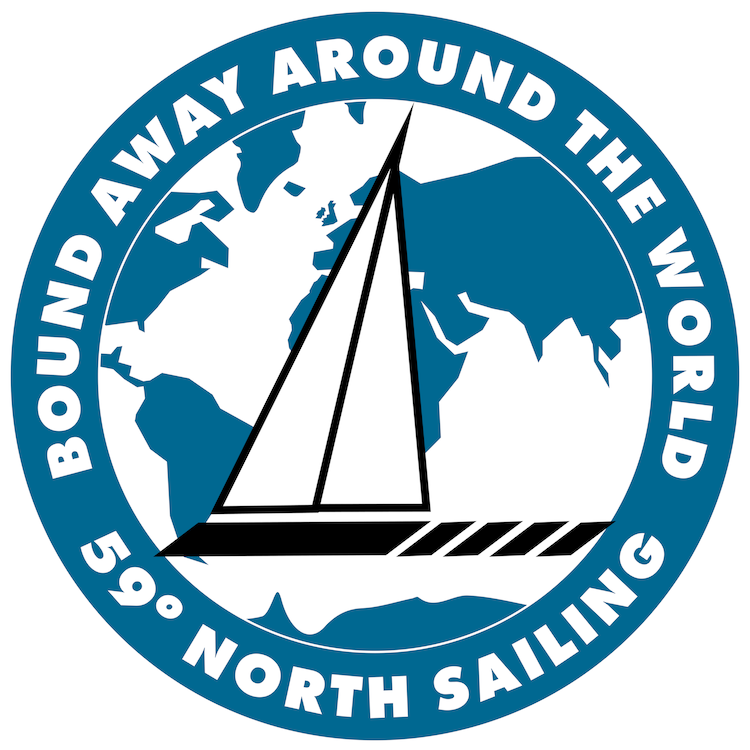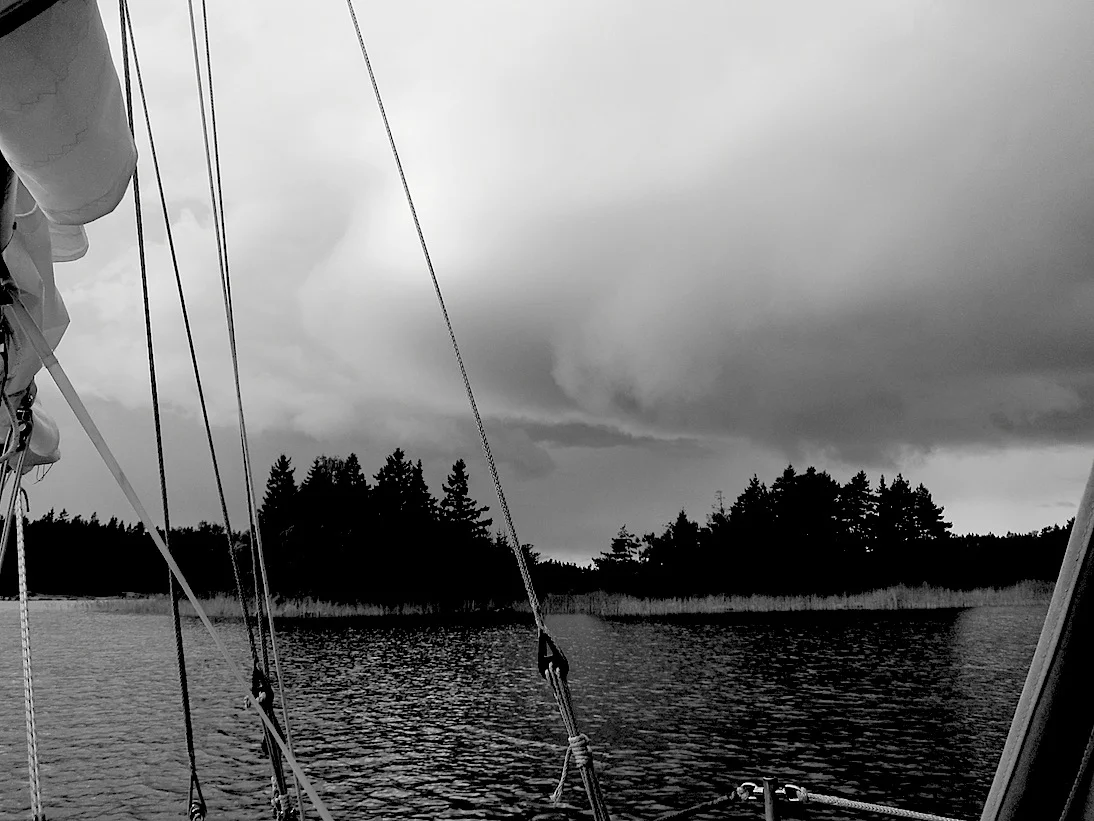Arcturus is hauled out now in Öregrund, Sweden, and Mia is begging for a proper fall day. Our last sail a couple weekends ago was also the only time we’ve had a real taste of fall here, despite it being nearly the middle of September.
Mia’s parents came out and joined us on the boat for a couple of days over the USA’s Labor Day Weekend. Thankfully – for the lack of crowds I mean – there is no such holiday here, and we had the entire cruising ground outside Öregrund completely to ourselves.
The day before Mia and I had taken the ferry over to the island of Grassö and ran for a couple of hours, covering a 13-mile loop around the gravel roads and through some forest tracks. The weather was changing, and it drizzled on us a bit, but it was still quite warm, so we ran in shorts and t-shirts, and sweated.
It was a preview though for Sunday, when Mia’s parents arrived to a very chilly morning and joined us for breakfast on the boat (‘hurricane eggs’, one of my all-time favorites on the boat. Take an extra-thick slice of homemade bread, cut out a hole in the middle of it, and with loads of butter in an iron skillet, crack two eggs into the hole and fry the thing as one unit. I like the eggs nice and runny).
We sailed out into the fairway between Grassö and the mainland, aiming south, and romped along on a broad reach in flat water. It’s the first time Mia’s parents have been actually sailing on our boat (they’d visited us once in the USA before we crossed the Atlantic, but had only slept aboard in Spa Creek in Annapolis, not ever actually hoisting sails). Mia’s dad napped while her mom knitted two pairs of socks over the course of their two-day visit.
We were excited to share with them a typical mooring along the cliffs in a small ‘nature harbor’ as they’re called, and found a perfect little hidey-hole to set up camp for the night. We walked along some forest paths worn into the woods over the years, and ate pumpkin soup and drank Scotch for dinner, followed by a rousing game of UNO in the little cabin of Arcturus.
The next day was the last sailing day of the season for us. We waited out some nasty thunderstorms in the morning, including one that dumped inches of hail on the marina where we’d been only the day before. We experienced a few little pebbles in our anchorage, only four miles away, but were stunned to see what had occurred on our return. The wind increased though with force, and shifted to the northwest, strong enough to encourage me to launch the dinghy and row out a second anchor just in case. The wind finally blew itself out, and we venture out, tacking our way back up the narrow channel and all the way into the marina.
That afternoon, the mizzen mast came down, the sails came off and we began the process of packing the boat up for the winter.
--
It felt like such a short summer! Then again, we lived on the boat for some eight weeks, sailed over 300 miles and probably used the boat more than most people do in an entire summer on the Chesapeake. I feel guilty leaving it for so long here unattended, though she’ll be in good hands. The yard dude at Grepen Marin in Öregrund couldn’t be friendlier, and will be looking after the boat while we’re gone. Weird to think that it’ll be a full ten months until we put it back in the water.
--
Which brings me to the topic I really wanted to write about today, discussing the future. There has been a lot of stories in the news lately about climate change and the sudden realization that the earth has actually been cooling over the past fifteen years or so, and that all those climate scientists are idiots at best, liars at worst. How Al Gore is peddling his snake oil in his traveling circus of presentations on his ideas of the future. Nowhere have I read anyone taking the stance of skepticism and patience. It's either 'yep, this is definitely happening,' or 'nope, this is a load of bunk.' Where's the middle ground?
Try counting the times in a newsy-type article on any topic – economics, housing, food, etc. – that someone makes a passing and rather nonchalant prediction. Most of the time these types of articles require that that prediction be true to reinforce the thesis of whatever it is someone is trying to explain. It’s simply assumed that this prediction is going to come true.
For example, one short blurb I read this morning about innovation in the USA in TIME – “The Chinese government – coming from far behind – has been pouring money into research and development at such a clip that” – and here it comes, that sneaky assumption - “according to one estimate from Batelle, a nonprofit technology-development group, its spending will surpass America’s in just ten years.” It's said with such nonchalance that it reads like fact.
Ten years. Ten years! This sneaky little prediction goes out a full decade, ostensibly as a way of scaring us Americans into shoveling more money into technology and engineering.
Predicting the future based on what's happened in the past. It's called 'conditional learning.' Oddly, I came across this term just recently studying for my Swedish driver's license exam. The simplest way to think of it is this - everyday you drive to work and pass an intersection that has a poor view to the right. But you never see any cars. You come to think, unconsciously even, that intersection is always free from traffic, so you unconsciously increase your speed day after day. And then, one day a car appears, and, bam! You've learned based on the prevailing conditions over time, have adapted your driving to them, but you've failed to account for the outlier.
A friend of mine and I chatted about what I feel is the fallacy of predicting the future of anything, but he disagreed in a way. This type of prediction, in particular, can act simply as a sort of scare tactic and actually change the outcome of the future it predicted. His point was we need these predictions to chart a course towards a future we want to see. Scare the Americans into thinking the Chinese will pass us, actions will change, and that prediction will ultimately fail, to our benefit. Fair enough.
It becomes dangerous when that chart is drawn based on the assumption that the prediction will come true. Take for example the city of Detroit. It’s municipal government set up it’s pension plans on the assumption that the money they stowed away and invested would return 8% for the life of the pension plan. 8%! Now the city has filed for bankruptcy. Imagine that.
There is a fascinating book called The Black Swan, on the surface about economics, but deep down really a philosophy book. It’s thesis is that traditional models of predicting the future are inherently flawed because they exclude ‘black swans,’ outlying events that might only occur once in history, but that are so big, they change the course of it permanently. Statistical anomalies off the bell curve that are just thrown out when creating mathematical prediction models. The 2008 financial meltdown was one. 9/11 was another. Hurricane Sandy yet one more recent example.
This business of predicting the future worries me when it comes to climate change (and economics for that matter, but that’s another issue). It’s impossible to accurately predict the local weather seven days out, so how in the world does anyone think predicting the future of the global-scale climate is going to turn out? Read about chaos theory sometime, how complex systems interact in such a way that it’s literally impossible to predict their outcome.
This is dangerous on both sides of the climate change argument – if we think humans are too small to affect the earth’s climate system and continue pumping pollution into the air and destroying the natural habitat, something is bound to change. It cannot be good. If we agree it’s already changing and decide to seed the clouds to make rain or block the suns rays with sulphur particles in the upper atmosphere, what the heck do you think the unintended consequences of that are going to be down the line? We do not understand the system as a hole, so should stop trying to predict it.
Anyway, I’m rambling here, but my point is that once you awaken to this idea of the fallacy of predicting the future, you’ll change your outlook on life. You’ll read the news differently. It doesn’t mean you can’t plan anything – on the contrary - but it does mean you might be less surprised when those plans change.


